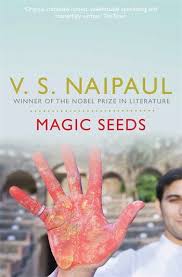MAGIC SEEDS
V.S. Naipaul was born in Trinidad in 1932. He came to England on a scholarship in 1950. He spent four years at University College, Oxford, and began to write, in London, in 1954. He pursued no other profession. His novels include�A House for Mr Biswas,�The Mimic Men,�Guerrillas,�A Bend in the River, and�The Enigma of Arrival. In 1971 he was awarded the Booker Prize for�In a Free State. His works of nonfiction, equally acclaimed, include�Among the Believers,�Beyond Belief,�The Masque of Africa, and a trio of books about India:�An Area of Darkness,�India: A Wounded Civilization�and�India: A Million Mutinies Now. In 1990, V.S. Naipaul received a knighthood for services to literature; in 1993, he was the first recipient of the David Cohen British Literature Prize. He received the Nobel Prize in Literature in 2001. He lived with his wife Nadira and cat Augustus in Wiltshire, and died in 2018. ... Read more Read less
In V. S. Naipaul's�Magic Seeds�we follow Willie Chandran, a man who has allowed one identity after another to be thrust upon him. In his early forties, after a peripatetic life, he succumbs to the encouragement of his sister ? and his own listlessness ? and joins an underground movement in India. But years of revolutionary campaigns and then prison convince him that the revolution ?had nothing to do with what we were fighting for?, and he feels himself further than ever ?from his own history?. When he returns to Britain where, thirty years before, his wanderings began, Willie encounters a country that has turned its back on its past and, like him, has become detached from its own history. He endures the indignities of a culture dissipated by reform and compromise until, in a moment of grotesque revelation ? a tour de force of parodic savagery from our most visionary of writers ? Willie comes to an understanding that might finally allow him to release his true self. ?A radical further step in one of the great imaginative careers of our time . . .�Magic Seeds�demands our attention, and nothing more authoritative will be published this year? Philip Hensher,�Daily Telegraph ... Read more Read less











